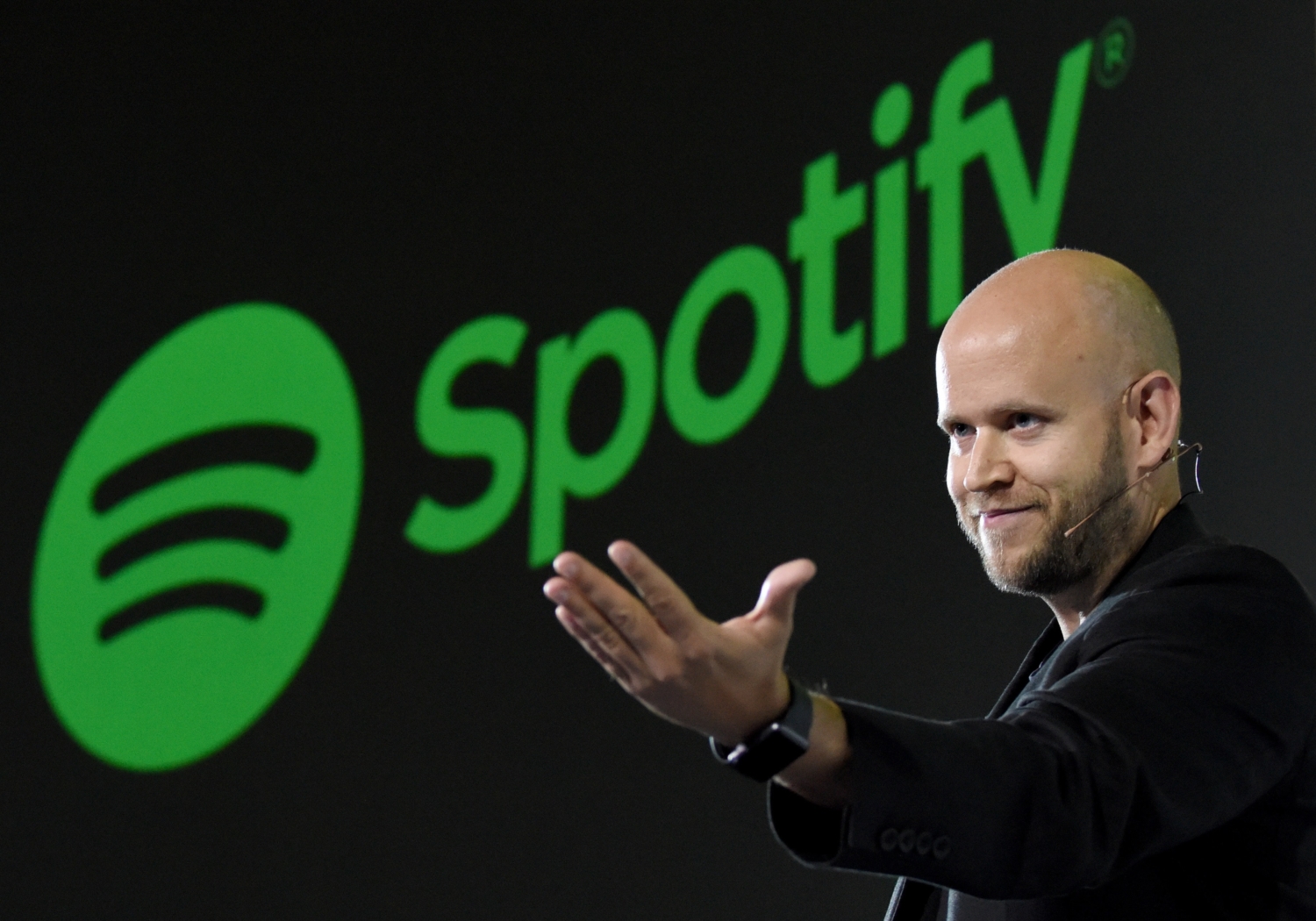Daniel Ek: Hey, I’ve got an idea! I could make money with a service called Spotify that gives away access to musicians’ product for free well almost free, and it’s all legal!
Wall Street: Brilliant idea! Here’s millions of dollars.
Consumers: Yay! Free music!
Daniel Ek: Gee, thanks! Now I can pay for an advertising campaign convincing people that this is the way of the future, and not to worry about those loser musicians!
Wall Street: Brilliant! Here’s more millions.
Daniel Ek: Thanks!
Consumers: Yay! Free music!
Musicians: Hey, wait-what? No! Our product isn’t free! This is how we pay our bills! Um…is it? Um…what just happened?
Major labels: shit-we’ve been blind-sided. But that Ek seems like a bright guy, he’ll play ball. Hey Ek, you can use our catalogue, but you have to pay us, capiche? We’re no suckers like those little labels and those loser musicians. Don’t worry, we’ll keep it on the hush hush, so you can still get their product for free. Deal?
Daniel Ek: Deal! By the way, I’m planning on going public with this shit, so you might wanna buy some stock while the going’s good!
Major labels: Deal!
Consumer: yay! Even more free stuff!
Daniel Ek: ( counts his billions) one…two…
Sounds absurd? And yet that’s more or less what has happened to the music industry in the last five years.
Of course, everybody loves free stuff. Free is the ultimate bargain. But is anything really free?
We are living in the ‘sharing economy’, a digital utopia, where hyper-connected, tech savvy consumers happily ‘share’ everything under the sun. With only a small fee to those tech geniuses who make it all possible, of course. Tech companies prolificate, with the bigger ones quickly becoming as powerful as any mega corporation, and new tech billionaires amassing huge fortunes at a tender age.
Tech companies take advantage of the fact that legislation hasn’t kept up with the digital age. Uber and Airbnb use the excuse that they’re “just an app” to skirt labor laws and avoid paying taxes. In the process they are putting thousands of taxi companies and mom and pop hostels out of business. Uber drivers are “independent contractors” meaning they have no job security or benefits and are responsible for paying self-employment taxes of 25% on whatever they make. Often they’re trapped in Uber’s own predatory car loans. AirBnB has been a devastating influence in cities all over the world, from my home New Orleans to Barcelona to…, as speculators have bought up properties en masse to use as AirBnB’s, thereby driving up rents, forcing out tenants, and further reducing the already critically low supply of affordable housing. Cities like New York and New Orleans have begun to fight back, and Japan is the first country to ban AirBnB outright.
The horrible working conditions and terrible wages in Amazon’s warehouses are well documented. Streaming companies are pulling the rug out from under ALL creative professionals, essentially robbing us of the ability to sell ( or ‘monetize” ) our creations. So are these companies digital revolutionaries making the world a better place, or simply robber barons in cyber space?
Like most of us, I spend way too much time on social media, and some of the online conversations I’ve had about this issue made my head spin. I’ve been told we should make music for “love” not money ( let me pay my mortgage company with “love” and see how they like it). I’ve been told that if I wanted to make money, I should go into tech or real estate, not music. And do music ‘on the side’. It seems many people have no clue what being a musician entails.
Society has always had a sneaking suspicion that creative professionals are getting a free ride. After all, musicians ‘play’. Actors ‘play’. Play, not work. Artists create paintings and sculptures, but aren’t they having fun? Aren’t they doing what they love? Who wouldn’t want a life like that? According to the puritan work ethic, work is supposed to be hard, boring, soul-crushing. Those who work ‘harder’ or maybe ‘smarter’ are ‘rewarded’ with a higher standard of living. We all get rewarded with vacation time, if we’re lucky, and eventually, the great equalizer of retirement, where we FINALLY get to enjoy life a little (if we’re lucky). Maybe even make a little music and art like all those freeloaders we always hear about.
Artists and especially musicians seem to thumb their noses at this devil’s bargain. Musicians, many believe, lead a glamorous life of excess, traveling the world, playing for thousands of people, partying non-stop, in a never-ending orgy of drugs, sex and booze.
Of course, for 90% of the people making a living in the music industry, this rock’n’roll fairytale, happily propagated by the music media, is pure fiction. The reality for those having the courage to try and make a living with their creations goes more like this. Lifelong insecurity, a strain on all relationships, and always the looming terror of growing older and becoming irrelevant in an ever changing industry, losing your ability to make a living. No wonder so many musicians get lost in a life of substance abuse.
In fact in some ways being a musician resembles more the life of a monk. The thousands of hours of practice, the many sacrifices, the giving up on so many things most of us take for granted, it’s almost-dare I say it? Spiritual. A musician friend of mine who’s been making a living touring the world with his music for 20 years, once told me that the only way he could make his conservative dad understand was by comparing being a musician to a calling for priesthood.
So when a shark like Daniel Ek comes along and single-handedly declares our product, music, the only thing we have to show for a life of dedication, worthless (and gives away ad interupted access to it)it’s not just a slap in the face, it’s a stab through the heart. And Ek is laughing all the way to the bank.
So what is the outcome of all this? Instead of touring to sell records, musicians now have to make records to book tours. The loss in income will somehow need to be made up by more touring and more merch sold. For some it will work out. For many it will not. Inevitably sustaining a career in music ( or art) will become much harder overall. Major label artists as always will have the advantage. For the rest, music threatens to become a hobby for the rich. Popular culture will more and more reflect their values and everybody else’s voice will be drowned out. Just what we need…
We are told this is ‘progress’ and the unstoppable onslaught of technology. But technology never was a value in and of itself. Technology, like all tools, can be used for good or bad. The way technology is used is based on decisions, decisions made by PEOPLE. I’m convinced Daniel Ek based the Spotify business model on the idea that musicians don’t deserve to get paid. He claims he can’t ‘afford’ to pay musicians. What does it say about his business model in the first place, if he can’t afford to pay the creators of the product he, after all, sells? He’s done quite well for himself, with a net worth of almost two billion. The average Spotify wage is $146 K a year, a wage most musicians can’t even dream of. Clearly there still IS money to be made in the music industry. Just not by musicians.
Google meanwhile, goes so far as to attack the very concept of copyright, the bedrock of any creative professional’s ability to make a living with his or her creations. These companies are no friends of creatives.
The digital revolution, like all revolutions, has its share of casualties. Self-driving cars are supposed to make millions of jobs obsolete in the coming years. Nobody seems to know or care what’s going to happen to the people working those jobs, or if that’s even a good thing. And on the horizon is Artificial Intelligence, or AI, threatening to make ALL of us obsolete. Are you listening, Isaac Asimov?
We are told we live in the post-ownership society. We don’t own our home, we just pay rent. We lease our cars. We stream our entertainment. But somebody’s owning the real estate, factories, supplies, parts, technologies, that’s making all this possible in the first place. Digital technology was supposed to liberate us, but this sounds more like slavery to me.
It doesn’t have to be this way. It’s not too late for a new approach to digital technology, one that is not solely driven by greed and contempt for anyone that dares to stand in the way. Streaming is here to stay, but streaming rates are not written in stone. A company as rich as Spotify can certainly afford to compensate its content creators fairly. Spotify should reveal the terms of its sweetheart deals with major labels and offer the same deal to everyone.
It is possible to have technology that benefits everyone, not just a few lucky tech entrepreneurs. Uber should accept its responsibility as an employer, not “just an app”. AirBnB could ban whole house rentals, which are the driving force behind mass speculation, and require their users pay taxes just like any bed and breakfast.
If Big Tech really wants to be seen as a beneficial influence in society, then they need to put their money where their mouth is. Greed as sole motivation rarely leads to good things for everyone. Maybe we need to rethink the role of entrepreneurs and innovators ? I’m not holding my breath…but anything else will create even more inequality, poverty and concentration of wealth at the top.
Everybody loves free stuff. But as the saying goes, there ain’t no such thing as a free lunch. SOMEBODY’s paying for it. And the price we will all end paying for all this ‘free’ stuff may well be more than we can afford.




